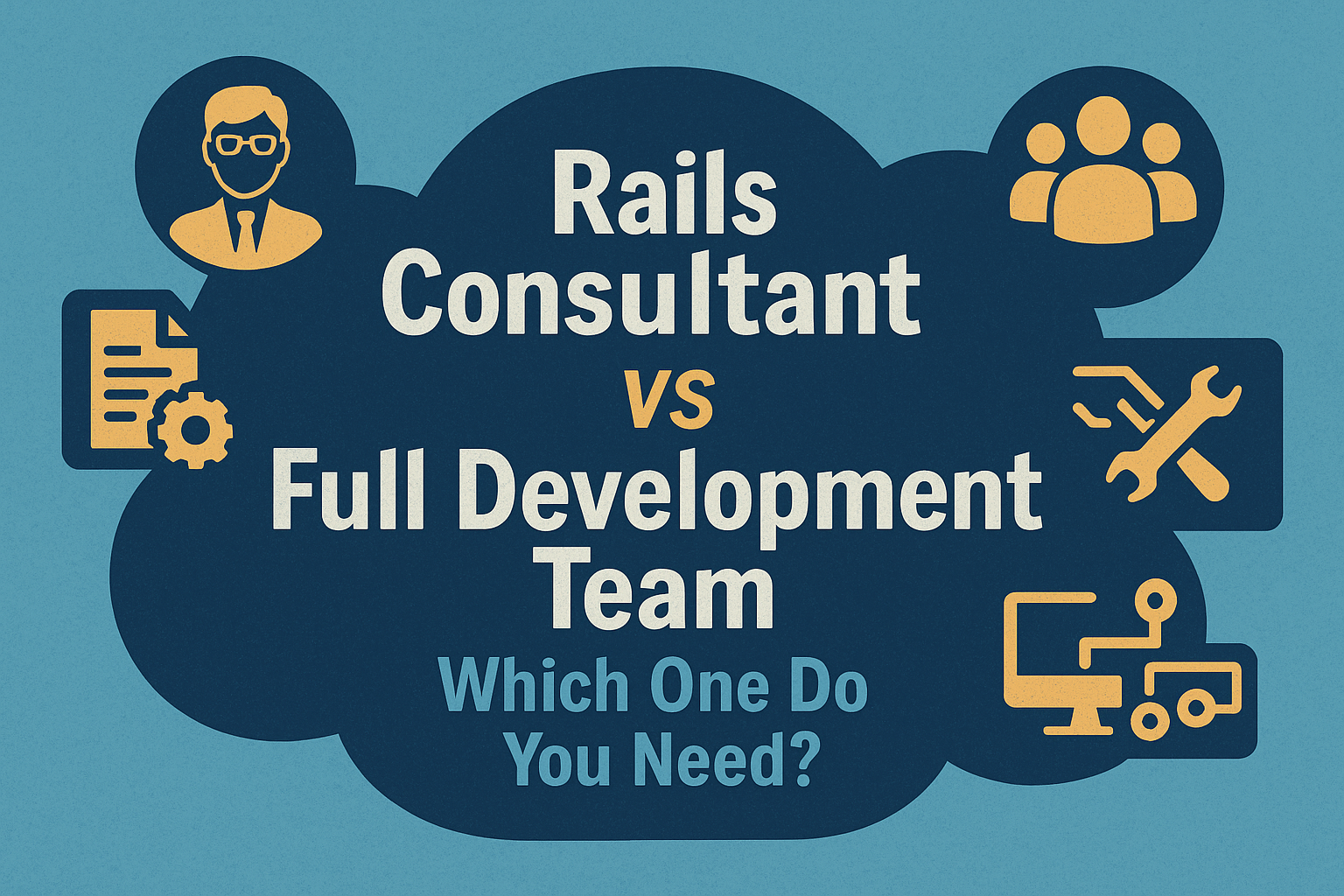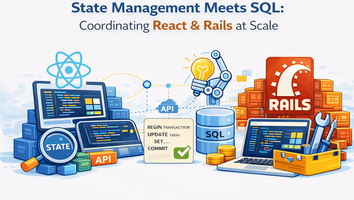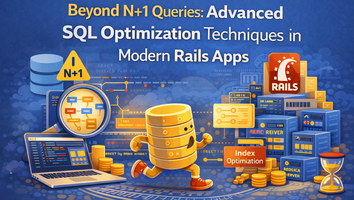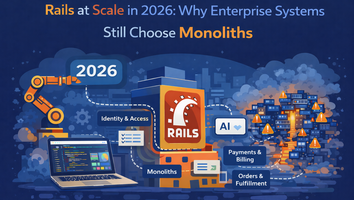At W3villa Technologies, we often engage with startups, enterprises, and scaling SaaS businesses who are at a crucial decision point: Should we hire a Rails consultant, or do we need a full Ruby on Rails development team?
It’s a question with long-lasting implications. Choose a rails consultant when your real need is a full team, and you may face missed deadlines or technical debt. Hire a team when a consultant would suffice, and you may end up overspending.
This blog will help you navigate that decision. We’ll explore the differences between both approaches, analyze when each is the right choice, and provide a practical framework to guide your decision.
Understanding the Two Models
What Is a Rails Consultant?
A Rails consultant is typically an experienced Ruby on Rails programmer with years of hands-on expertise in building, scaling, and optimizing applications. Instead of acting as a full team, they provide high-value guidance and targeted development.
Rails consultants usually specialize in:
- Architecture reviews – Ensuring your application is scalable and future-ready.
- Performance optimization – Identifying bottlenecks and refactoring inefficient code.
- Code audits & mentoring – Raising the standard of your internal team’s output.
- Short-term delivery – Adding features or fixing legacy codebases with speed.
- Ruby on Rails consulting services – From technical strategy to implementation support.
What Is a Full Development Team?
A Ruby on Rails development team involves a cross-functional group that collectively covers the entire lifecycle of a web application. This includes:
- Ruby on Rails programmers (backend developers)
- Frontend engineers (React, Vue, or JavaScript specialists)
- Designers & UX experts
- QA & testing specialists
- DevOps engineers for CI/CD and infrastructure
- Project managers & product owners
This setup ensures that the project moves from idea to deployment with structured accountability and end-to-end ownership.
Why the Choice Matters
At W3villa Technologies, we’ve seen projects succeed or fail based largely on the team model selected at the outset. This decision impacts:
- Cost structure – Consultants cost more per hour but require no overhead. Teams require larger upfront commitments but offer long-term stability.
- Speed of execution – A full team can work in parallel, while consultants focus deeply but sequentially.
- Risk profile – Consultants represent a single point of failure; teams distribute risk across multiple roles.
- Scalability – Your ability to ship features and grow the product is tied directly to the manpower and expertise available.
Rails Consultant: When They’re the Right Fit
There are specific scenarios where bringing in a Rails consultant is the most efficient solution.
1. You Have an Existing Team That Needs Guidance
If you already have junior or mid-level Ruby on Rails programmers, a senior consultant can guide architecture, review code, and help with technical decision-making.
2. Short-Term, Well-Defined Projects
When the scope is clear—such as integrating a payment gateway, conducting a security audit, or building a specific API—a consultant can deliver quickly without the long-term cost of a full team.
3. Legacy App Modernization
Older Rails apps often face challenges like outdated gems, monolithic codebases, or performance bottlenecks. A consultant with deep Rails expertise can refactor, upgrade, and optimize these systems efficiently.
4. Technical Due Diligence
Before acquisitions, fundraising, or scaling, organizations often hire Ruby on Rails consulting companies to perform audits and risk assessments.
5. Lean Startups with Tight Budgets
For startups still testing ideas, engaging a consultant for rapid MVP development can be smarter than hiring an entire team prematurely.
Full Development Team: When You Should Invest
A dedicated Ruby on Rails team is the right choice when your needs go beyond short-term tasks.
1. Building a Product from Scratch
If you’re launching a SaaS platform, marketplace, or enterprise system, you’ll need a cross-functional team to move from design to deployment.
2. Continuous Development Roadmap
For businesses planning multiple iterations and feature releases, a full team ensures consistent velocity and reliability.
3. Multiple Workstreams in Parallel
When frontend, backend, and DevOps tasks must proceed simultaneously, a single consultant cannot match the efficiency of a full team.
4. Accountability and Ownership
A team distributes responsibility across roles, reducing dependency on one individual. For enterprises, this model aligns better with governance and compliance requirements.
5. Scaling Beyond MVP
Once your product gains traction, user expectations grow quickly. A full development team ensures you can scale features, performance, and infrastructure simultaneously.
The Middle Ground: Hybrid Approaches
At W3villa Technologies, many of our clients choose a hybrid engagement model that combines the best of both worlds.
- Consultant as Technical Lead – A senior Rails consultant sets the direction, while a distributed team executes.
- Start with Consultant, Scale to Team – Begin lean with a consultant to build the MVP, then transition to a full team as traction grows.
- On-Demand Specialists – Maintain a core team but bring in consultants for niche needs like security audits or performance tuning.
This hybrid approach is particularly effective for startups and mid-sized companies navigating growth.
Best Practices for Engaging Rails Experts
Regardless of whether you select a consultant or a full team, certain practices ensure success:
For Rails Consultants
- Clearly define deliverables and acceptance criteria.
- Establish regular check-ins and transparent communication.
- Ensure proper documentation and knowledge transfer before project close.
For Full Development Teams
- Set up agile processes (sprint planning, retrospectives, backlog grooming).
- Implement CI/CD pipelines and automated testing early.
- Foster cross-training to avoid single points of failure.
- Align technical output with business objectives through structured product management.
Why Choose W3villa Technologies for Ruby on Rails Consulting
As a trusted Ruby on Rails consulting company, W3villa Technologies has over a decade of experience delivering scalable, secure, and high-performance Rails applications. Our offerings include:
- Ruby on Rails consulting services for architecture design, audits, and modernization.
- Dedicated Ruby on Rails programmers to work as an extension of your in-house team.
- Full-stack Rails development teams for startups, enterprises, and SaaS products.
- Custom engagement models: from one-time consultancy to long-term dedicated teams.
We combine technical expertise with agile project management, ensuring that your business goals remain central to our development strategy.
Conclusion
Choosing between a Rails consultant and a full Ruby on Rails development team is more than a resourcing decision — it’s a strategic move that defines your product’s future. At W3villa Technologies, we’ve successfully guided businesses across all three paths. Whether you need expert Ruby on Rails consulting services or a dedicated development team, our tailored solutions ensure you get exactly what your project requires — nothing more, nothing less.



